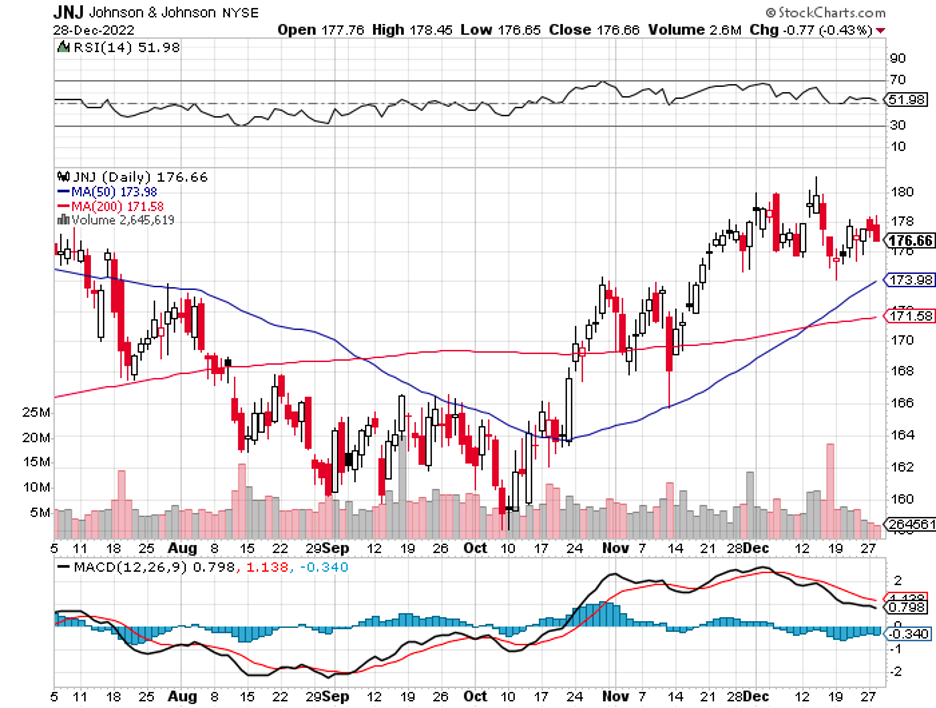A Promising Start to 2023
Investors will be grateful to finally leave 2022 behind as the markets weathered a challenging year. For 2023, we can anticipate much of the same, at least in the first six months, which is why it’s crucial to fill your portfolio with high-quality blue-chip stocks.
Johnson & Johnson (JNJ) fits this description.
With $469 billion in market capitalization, JNJ is the biggest drugmaker across the globe, easily surpassing its peers by over $100 billion. Its product portfolio is practically unrivaled, with the company catching up in the COVID-19 vaccine race and matching the pace of Pfizer (PFE) and Moderna (MRNA). More importantly, the company has more than a dozen treatments that are on pace to go beyond $1 billion in sales this 2022.
In the third quarter of 2022, JNJ’s revenue climbed by 1.94% year-over-year to reach $23.79 billion, beating Wall Street estimates by $357.93 million. The company also started to spend more on R&D, particularly for the expansion of its medtech sector.
Recently, JNJ closed the deal to acquire Abiomed (ABMD), a leader in the manufacture of heart pump solutions, to boost its medtech segment.
This acquisition is in line with JNJ’s plan to separate its consumer products division from its pharmaceutical and medtech segments. The addition of Abiomed aligns with JNJ’s plan to integrate a smart data approach in the creation and development of new drugs. The company is also looking into leveraging new technology to bolster its medical device division.
After the split is completed, JNJ is projected to become a $60 billion biopharmaceutical entity by 2025. The primary growth drivers would be its major brands and strategic product launches. Meanwhile, the medtech segment is expected to rack up sales as well since its growth will no longer be hampered by the consumer health division, which typically faces litigations.
Specifically, Abiomed will bring its lead product, Impella, to JNJ’s pipeline, which would be an excellent addition to its cardiovascular devices portfolio. This would be a promising revenue stream for the company since the cardiovascular devices market is estimated to climb at a CAGR of 6.9%. It is projected to expand from a market size worth $54.08 billion in 2021 to $86.27 billion by 2028.
As for Impella, this smart implantable pump is anticipated to rake in more than $3.8 billion in revenue by 2031.
The split is a good business decision for JNJ. In the nine months leading to October 2022, pharmaceutical sales were noted to be at their peak at $39.4 billion. JNJ also unveiled more innovative therapeutics in this segment, including CAR-T meds and gene therapies, on top of expanded indications for well-established treatments and investigational drugs.
Some of the treatments poised for potential blockbuster status in 2023 are oncology drugs Darzalex, pulmonary hypertension medication Opsumit, immunology treatment Remicade, and cardiovascular drug Xarelto. The company also submitted multiple myeloma treatment Talquetamab for regulatory approval next year.
Apart from these, JNJ is expected to unveil at least 14 more new treatments that hold a sales potential of over $1 billion each. Meanwhile, half of the candidates are projected to rake in $5 billion or more in sales.
In comparison, the consumer health segment recorded $11.1 billion, indicating a 1.1% slide year over year.
These reports show why the news of the company's split comes as a relief for many of its investors, especially in light of how impressive its pharmaceutical business has been performing as of late. Considering that JNJ is in dire need of evolving while integrating groundbreaking technology, keeping its pharmaceutical and medtech segments tied to its consumer health division would inevitably drag sales down.
Overall, JNJ remains an excellent choice for those looking for high-quality stocks to add to their portfolio. However, it would be advisable to buy after the split. This is because the share price would most likely drop by then, offering us the chance to invest in a company geared towards the medtech and pharmaceutical space.

